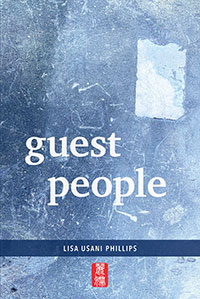 *
*
Interview by Doug Holder/ New England Poetry Club – Board of Directors
Recently, I was out in Amesbury, Ma. for a memorial reading for the late Poet Laureate of Amesbury, Lainie Senechal. The reading was on the grounds of the Whittier House. There I met poet Lisa Usani Phillips, the current Poet Laureate, and she told me she has a new book of poetry out titled Guest People (Wheeling Tern, 2022). She generously agreed to this interview.

Doug Holder: You have quite an ethnic mix of Asian and Irish, two very different cultures. How do you feel that is reflected in your work?
Lisa Usani Phillips: In terms of ethnicity, I’m Hakka Chinese by way of Thailand on my mother’s side and Irish, as well as English, German, and Dutch by way ofPhiladelphia on my dad’s side. Growing up biracial, Asian and White, the daughter of a first-generation immigrant and a psychiatrist in an upper-middle-class Connecticut household, I experienced marginalization as well as privilege. Some called me racial slurs or asked me “what” I was, while others seemed surprised that I experienced any racism or prejudice at all. I also acknowledge my own implicit biases. So I write from and about this mix and find myself drawn to hybrid forms like zuihitsu, haibun, prose poems, and even concrete poems, which seem to facilitate questions about the ways we see ourselves in the world, how the world sees us. My debut collection, Guest People (Wheeling Tern, 2022), is a hybrid of poetry, story, and photography.
DH: We are given names at birth, and for many of us, we don’t think deeply about them. You do, and you write poems exploring your name and your mother’s. So, what’s in a name?
LUP: That’s a good question. I’ve always been curious about names and their meanings and power. In my family, names were a form of assimilation – my mom had a Chinese name and a Thai name growing up, and then when she came to the U.S. she had an English name. When I was a kid, I did not use my middle name, Usani, which is my mother’s Thai name, because it was easier not to. I didn’t even know how to pronounce it correctly. As an adult, I grew to love my middle name as well as the Chinese name my grandfather gave me, Li Shan, because they are unique, beautiful in sound and meaning. I cherish them as a way to celebrate my heritage and my connection with my mother.
DH: I had a strong feeling from your writing that your family had to cover up their ethnic background. Even their facial features were abhorrent to some segments of society. You seemed to fight this need to totally assimilate, the slits of your eyes remained, you would never be a wide-eyed white woman.
LUP: Some of the poems in this collection are a fictionalized take on what my maternal grandparents did to assimilate as Hakka/Chinese immigrants to Thailand in the 1940s, and what my mom and her relatives did when they emigrated to the United States. Other poems are rooted in my own struggles with assimilation and the quest for authenticity, as well as questions about where racism comes from and how we construct social identities. In Slant, the speaker is a young Chinese American and White girl who wants to look like her Chinese relatives, but in doing so, offends them with a gesture that racists use to mock Asians and Asian Americans. In another poem, Avatar, the mixed Asian American speaker encounters her friend/photographer’s clueless instruction to open her eyes wider, but does not call it out. So, the speaker fights, perhaps, but also succumbs to assimilation, keeping the peace.
DH: You recently have been appointed Amesbury Poet Laureate. How did that come about? What plans do you have as the new laureate?
LUP: Last fall I heard that Ellie O’Leary was stepping down as Amesbury Poet Laureate, so I introduced myself to her, said I was interested in the position, and she encouraged me to apply. This was right before I was taking time off to have and recuperate from major surgery, so it was a pleasant if somewhat overwhelming surprise to be chosen. As laureate, my mission is to promote poetry, poets, and literary citizenship in Amesbury, mostly through continuing our monthly poetry reading and open mic series, which I organize and host with help from the Amesbury Poet Laureate Support Committee, the Amesbury Cultural Council (ACC), and the John Greenleaf Whittier Home. While some of our featured poets have an Amesbury connection, I also aim to bring the wider world of poets to our community. I was able to get a grant from the ACC to pay our featured poets an honorarium, which is a new thing that I’m particularly proud of. We have also started posting recordings of the readings on YouTube (@AmesburyMAPoetLaureate) and have also worked with Amesbury Public Library and other local libraries to promote events and activities for our National Poetry Month celebrations.
DH: Why should we read your book?
LUP: Several readers said that they really liked the fact that I write about Market Basket as well as Bangkok, that it’s accessible, and has a generous range of topics and forms for a book of its size. In addition to Market Basket, assimilation, hybrid forms, and names, you’ll find bees, bittersweet, tattoos, love, grief, mermaids, and a flying octopus.















Reader Comments